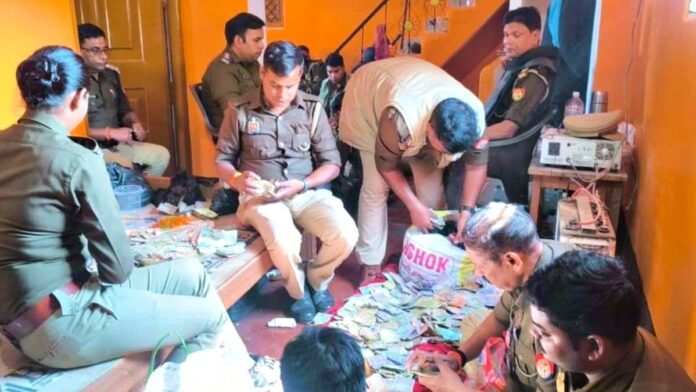
Key Points
- Record ₹2.01 crore cash recovered from drug smuggler Rajesh Mishra’s home in Pratapgarh
- Police seize 6.075 kg marijuana worth ₹3 lakh and 577 grams smack valued at ₹1.15 crore
- Jailed mafia’s wife Reena ran entire network on his instructions via phone from prison
- Five family members arrested including wife, son, daughter, and two relatives
- Total seizure worth ₹3 crore marks largest cash recovery in UP drug case history
- SP Deepak Bhukar, who cracked down on Atiq-Ashraf, leads operation
Pratapgarh: what authorities are calling the largest cash seizure related to narcotics trafficking in Uttar Pradesh Police history, officers from Manikpur police station in Pratapgarh district recovered precisely ₹2,01,55,345 in cash during an overnight raid conducted on Saturday, November 8, 2025. The massive haul consisted primarily of small denomination notes ₹20, ₹50, and ₹100 bills stuffed into polythene bags, cloth sacks, and plastic pouches hidden throughout different sections of the house.
The sheer volume of currency notes overwhelmed initial counting efforts. Police had to deploy note-counting machines that ran continuously for approximately 22 hours before the final tally was confirmed. Officers stated that the predominance of small-denomination notes indicated the cash represented proceeds from retail-level drug sales accumulated over an extended period.
The Income Tax Department has been formally notified about the cash recovery to initiate parallel investigations into potential tax evasion and money laundering violations associated with the illegal narcotics trade.
Substantial Drug Stockpile Seized
Beyond the record cash haul, police recovered a significant inventory of narcotics during the comprehensive search operation. Officers seized 6.075 kilograms of marijuana (ganja) valued at approximately ₹3 lakh in the illicit market, and 577 grams of smack (heroin) estimated to be worth ₹1.15 crore based on current street prices.
The total value of the entire seizure, combining cash, marijuana, and heroin, amounts to approximately ₹3 crore, representing one of the most significant drug-related confiscations in the state’s recent history. The drugs were found concealed in black plastic wrapping in various locations throughout the residence, indicating sophisticated storage and distribution operations.
Operation Led by Mafia-Buster SP Deepak Bhukar
The successful raid was conducted under the direct supervision of Superintendent of Police Deepak Bhukar, an officer with an established reputation for taking down organized criminal networks. SP Bhukar previously gained prominence for his relentless crackdown on notorious mafia figures Atiq Ahmed and his brother Ashraf in Prayagraj, demonstrating his commitment to dismantling criminal empires regardless of their political connections or intimidation tactics.
Under SP Bhukar’s strategic direction, a specially assembled police team comprising officers from Manikpur police station, excise department personnel, and intelligence operatives executed the meticulously planned operation. The raid was conducted after weeks of surveillance and intelligence gathering that confirmed the family’s continued involvement in narcotics trafficking despite the patriarch’s incarceration.
Dramatic Raid on Drug Lord’s Residence
The police team arrived at the residence of Rajesh Mishra in Mundipur village under Manikpur police station jurisdiction late Saturday night. Upon seeing the officers, the occupants immediately attempted to lock themselves inside the house, raising immediate suspicions about illicit activities.
When police forcibly entered the premises in the presence of a magistrate to ensure legal compliance, they discovered five individuals frantically attempting to conceal contraband wrapped in black polythene sheets and plastic bags. The suspects were caught red-handed trying to hide both drugs and cash in various hiding spots throughout the residence.
The house search revealed a sophisticated concealment strategy with currency notes and drug packages hidden in multiple locations, including false ceiling panels, storage containers, furniture compartments, and buried containers, indicating professional-level smuggling operations designed to evade detection during potential raids.
Five Family Members Arrested
Police arrested five members of the drug smuggling network during the operation, all relatives of jailed kingpin Rajesh Mishra. The arrested individuals include:
Reena Mishra: Wife of Rajesh Mishra and the operational head of the narcotics network. She allegedly coordinated all smuggling activities, managed financial transactions, supervised drug storage and distribution, and maintained contact with suppliers and buyers across multiple districts.
Vinayak Mishra: Son of Rajesh and Reena, actively involved in ground-level operations. Police records show Vinayak has previous arrests under the NDPS Act, indicating long-term involvement in the family business.
Komal Mishra: Daughter of Rajesh and Reena, who assisted in coordinating logistics and maintaining the network’s financial records.
Ajit Kumar Mishra: Relative who handled transportation and delivery of narcotics to various distribution points.
Yash Mishra: Another family member involved in procurement and storage operations.
All five have been charged under the Narcotic Drugs and Psychotropic Substances (NDPS) Act, with additional charges expected as investigations proceed.
Criminal Empire Run From Behind Bars
Investigations revealed that despite being imprisoned, Rajesh Mishra continued to orchestrate his multi-crore drug smuggling network through a sophisticated communication system. He issued detailed instructions to his wife Reena and other family members during jail visits and through mobile phones that were either smuggled into the facility or during authorized communication periods.
Reena Mishra emerged as the operational mastermind who executed her husband’s directives with remarkable efficiency. She managed the entire supply chain—from procurement to distribution coordinated with interstate suppliers, maintained financial accounts, ensured timely deliveries to buyers across Uttar Pradesh and neighboring states, and handled proceeds from drug sales.
Police sources indicate the network operated across multiple districts with an extensive distribution system that supplied marijuana and heroin to various locations in eastern Uttar Pradesh, parts of Bihar, and potentially into Nepal border regions. The family had established the operation over many years, gradually building a reputation for reliable supply and creating a steady customer base.
Pattern of Criminal Activity and Previous Actions
This is not the first time authorities have targeted Rajesh Mishra’s criminal empire. Police records show that Rajesh faces 14 registered criminal cases, including multiple violations under the NDPS Act and charges under the Gangsters Act. His extensive criminal history spans several years of narcotics trafficking and organized crime.
In September 2025, authorities had already seized properties worth ₹1.56 crore belonging to Rajesh and Reena Mishra under the Gangsters Act, reflecting earlier efforts to dismantle their financial infrastructure. According to the latest information, total property worth ₹3.6 crore (₹3,62,68,95.50) belonging to the couple has now been attached or seized by authorities through various legal proceedings.
Despite these previous actions and Rajesh’s imprisonment since October 2019, when he was arrested by the Special Task Force, the family continued expanding their illegal operations, accumulating the massive cash reserves discovered in the recent raid.
Shocking Revelation: Fake Bail Documents
A particularly disturbing discovery emerged during the interrogation of the arrested family members. Investigators found that Reena Mishra and son Vinayak Mishra had obtained Rajesh Mishra’s release from jail on at least one occasion using forged bail documents and fraudulent court orders.
A separate criminal case has been registered regarding this bail fraud, with charges including forgery of official documents, impersonation, and criminal conspiracy to obstruct justice. This revelation raises serious questions about institutional vulnerabilities that allowed such manipulation of the legal system.
Authorities are now investigating whether court officials, lawyers, or police personnel were complicit in facilitating the fake bail, potentially involving corruption at multiple levels of the criminal justice system.
Interstate Narcotics Network Exposed
Evidence collected during the raid and subsequent interrogations indicates that the Mishra family network operated on an interstate scale. Police have confirmed the gang was actively smuggling marijuana sourced from various regions and heroin (smack) likely originating from international supply chains through established criminal networks.
The operation supplied narcotics to buyers across multiple districts in Uttar Pradesh, with distribution networks extending into neighboring Bihar and potentially reaching Nepal border areas where demand for drugs remains high. The small-denomination currency recovered suggests widespread retail-level sales to individual consumers rather than wholesale distribution alone.
Ongoing Investigation and Future Actions
Police officials have stated that investigations continue to identify additional members of the smuggling network, trace the complete supply chain from source to end consumers, identify corrupt officials who may have facilitated the operation, locate and freeze additional assets purchased with drug proceeds, and prevent the network from reconstituting under new leadership.
The case highlights both the persistence of organized criminal networks that continue operating despite arrests of key figures, and the effectiveness of determined law enforcement efforts led by officers like SP Deepak Bhukar, who refuse to be deterred by criminal networks’ attempts to operate from behind bars.
The record-breaking seizure sends a strong message about the Uttar Pradesh government’s intensified crackdown on narcotics trafficking under Chief Minister Yogi Adityanath’s administration, which has made eliminating the drug trade a key law enforcement priority.





















































